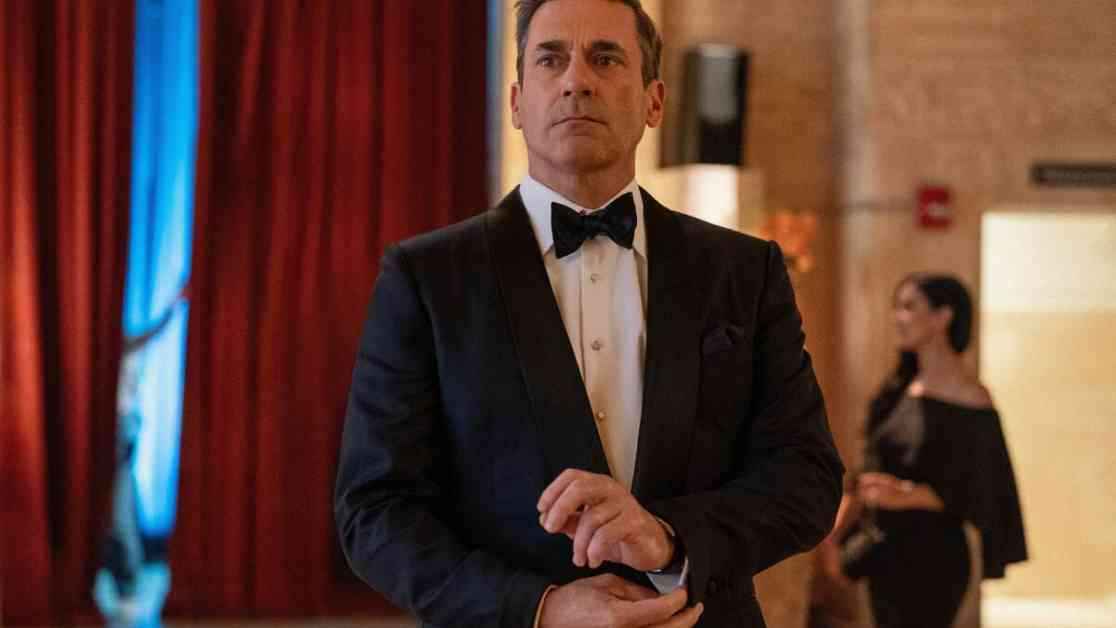In the riveting new series “Your Friends & Neighbors,” debuting on Apple TV+ this Friday, audiences are introduced to a complex web of relationships and personal struggles set against the backdrop of an affluent New York City suburb. At the center of the narrative is Jon Hamm’s character, Andrew Cooper, known as Coop, a hedge fund trader whose life is upended when he loses his job due to a breach of company policy.
Coop’s life takes a downward spiral as he navigates the aftermath of his dismissal, coping with a failed marriage to Mel (portrayed by Amanda Peet) and the betrayal of his best friend, Nick (played by Mark Tallman). He grapples with the challenges of parenting his children, Tori and Hunter, all while facing a breakdown in communication within his family unit.
The affluent community where Coop resides with his friends and neighbors serves as a microcosm of wealth and privilege, where intricate relationships and hidden secrets abound. Coop finds solace in a tumultuous affair with Sam, a character portrayed by Olivia Munn, amidst a backdrop of infidelity and deception.
As Coop attempts to maintain the facade of his former lifestyle, he resorts to desperate measures, including stealing valuable items from acquaintances. This descent into criminal activity leads him into dangerous territory, reminiscent of the acclaimed series “Breaking Bad,” where moral ambiguity and self-discovery collide.
The narrative unfolds through Coop’s introspective narration, reminiscent of the iconic voice of writer Joan Didion, providing a stark commentary on the emptiness and materialism that pervades his social circle. The series delves into themes of identity, privilege, and the quest for fulfillment in a world defined by material wealth and social status.
Despite the allure of luxury and excess that surrounds Coop and his peers, a sense of disquiet and disillusionment permeates their interactions, hinting at deeper emotional and psychological conflicts. The series explores the dynamics of power and gender within these relationships, shedding light on the complexities of modern-day social hierarchies.
As Coop grapples with the consequences of his actions and the moral dilemmas he faces, viewers are drawn into a gripping narrative that blurs the lines between right and wrong. The series raises questions about the nature of truth, deception, and the lengths to which individuals will go to preserve their sense of self in a world driven by appearances.
Amidst the opulent settings and extravagant lifestyles depicted in “Your Friends & Neighbors,” a sense of existential angst and yearning for connection emerges, underscoring the universal struggles of the human experience. The series invites viewers to reflect on their own values and priorities, prompting a deeper exploration of the complexities of human relationships and the pursuit of authenticity in a world fraught with contradictions.
As the story unfolds, the characters grapple with their individual demons and societal expectations, navigating the treacherous waters of privilege and power with varying degrees of success. Each episode offers a glimpse into the inner lives of these flawed and fascinating characters, inviting audiences to ponder the nature of truth, betrayal, and redemption in a world where appearances often deceive.
As audiences embark on this immersive journey into the lives of “Your Friends & Neighbors,” they are confronted with a tapestry of human emotions, desires, and insecurities that resonate on a profound level. The series challenges viewers to confront their own assumptions and biases, urging them to delve beneath the surface of outward appearances to discover the true essence of the human spirit.
In a world where wealth and status reign supreme, “Your Friends & Neighbors” dares to peel back the layers of privilege and facade to reveal the raw, unvarnished truth that lies at the heart of human existence. Through the lens of Coop and his companions, audiences are presented with a mirror reflecting the complexities and contradictions of contemporary society, inviting them to ponder the eternal quest for meaning and connection in a world fraught with uncertainty and illusion.
As the series unfolds, viewers are left to ponder the fate of its characters and the moral dilemmas they face, grappling with the consequences of their choices and the challenges of self-discovery in a world defined by its superficial trappings. As the narrative twists and turns, “Your Friends & Neighbors” offers a poignant reflection on the nature of identity, love, and redemption, challenging audiences to confront their own truths and vulnerabilities in the process.














